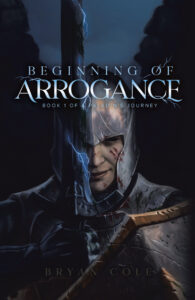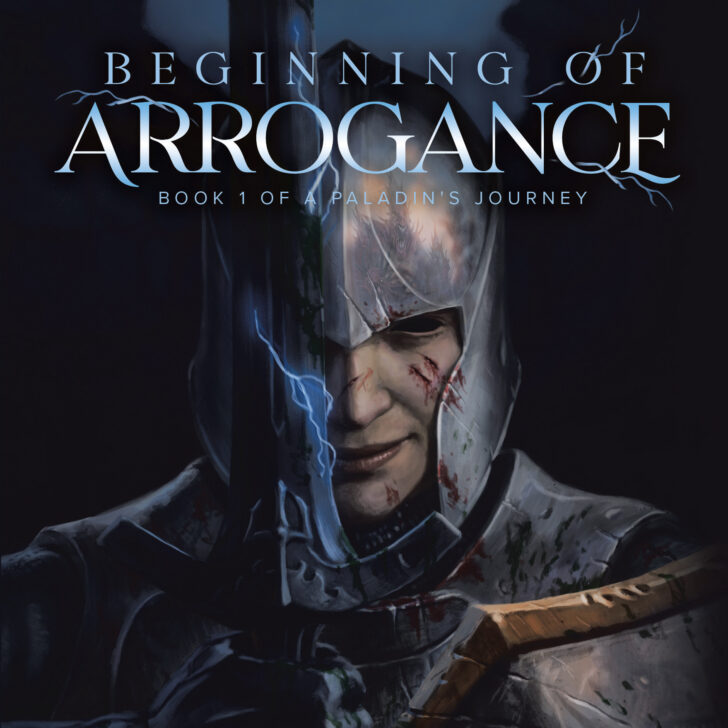Beginning of Arrogance by Bryan Cole

Paladins are nothing but trouble. Stories about paladins are everywhere, noble warriors riding magic steeds into battle against terrible foes. Champions of their gods. Heroes to everyone, except those who already have everything. Paladins are notorious for upsetting the balance of power, to the detriment of any who don’t worship their deity.
So when Krell is called to service by the capricious god of the seas and skies, ReckNor, those with wealth and power can’t help but be concerned. ReckNor hasn’t called a paladin in years, and his nature is ever-changing and erratic. The fact that Krell is also an uneducated nobody with a stubborn streak as wide as the sea turns their concerns into fear.
All of which matters less than the threat clawing its way from the waves, ready to turn the ocean red with spilled blood…
Beginning of Arrogance Review
I was compensated with a small amount for my time and effort in reading the book and writing this review. However, all thoughts and opinions expressed are my own and are based on my honest personal experience reading the book. Nor did the publisher in any way shape or form ever pressure me to give a positive review.
In Beginning of Arrogance, paladins are both renowned and feared, revered as noble warriors riding magical steeds into battle against formidable adversaries. However, their actions often upset the delicate balance of power, causing unrest among those who already hold privilege and authority. When Krell, an uneducated and tenacious individual, is unexpectedly summoned by the capricious god of the seas and skies, ReckNor, the wealthy and influential becomes apprehensive. With ReckNor’s nature ever-changing and unpredictable, coupled with Krell’s lack of prestige, their concerns evolve into deep-seated fear. Yet, overshadowing these worries is a formidable threat emerging from the depths of the ocean, poised to unleash a wave of destruction and carnage.
One thing that I noticed quite prominently was that the book tends to lean more towards being character-focused rather than plot-focused at times. Although I only noticed after I was into the story for a bit already, it was the first stand-out factor I noticed enough for me to add to the review first on my list. Evaluating this balance between these two usually is a bit challenging for me, as it hinges on the nature of the specific book and is highly context-dependent. In the case of Beginning of Arrogance, I believe there was a variation between different spots in the book. With it being less (near the beginning) to more (near the end) of an issue as I progressed with my reading.
As a fantasy enthusiast, I thoroughly appreciate the dynamic between Krell and ReckNor. The portrayal of the god and human trope relationship is a highlight for me. Their interactions are natural to read, and the alignment of their personalities, behaviours, and reactions to each other’s distinct traits, speech, and more, makes perfect logical sense.
This is closely tied to my appreciation for the nuanced characterization between Krell and ReckNor respectively. As I mentioned earlier, this book leans more towards being character-driven rather than plot-driven. Consequently, the thematic nuances and “gray areas” are more commonly prominent in the character dynamics than the plot or even worldbuilding at times.
Another thing I noticed is that the fantasy writing style employed in this book leans toward a more adult high fantasy style rather than the young adult fantasy spectrum. The narrative showcases a mature writing tone, characters, and other elements that resonate with a more adult audience in a manner that is age-appropriate. I can envision this book being particularly appreciated by fans of more mature adult high fantasy literature.
While Beginning of Arrogance managed to maintain its appeal (particularly in the initial stages) despite its character-focused nature, I noticed a gradual decline in my engagement as the story unfolded, especially towards its conclusion. Initially, I admired how the narrative sustained my interest despite a somewhat less pronounced plot. However, with the progression of the story, I found myself growing detached and contemplating putting the book down because it just became too character-focused for me. Especially how interesting the premise sounded to me from the synopsis this became more and more of a disappointment as I read the book further and further.
Upon reflecting on my reading journey, it occurred to me that the initial emphasis on character development and world-building, which is quite typical in many book introductions, might have softened my concerns early on. In those opening chapters where laying the groundwork for characters and their surroundings is crucial, I was already accustomed to a more deliberate exploration of these elements. This initial familiarity probably played a role in my more lenient approach toward the narrative’s focus on characters rather than an intricate plot. However, as the story unfolded, and my expectations for a more complex plot intensified, the impact of the character-centric approach became more apparent and, to some extent, affected my overall connection with the narrative.
Purely based on my own personal experience with the story, I want to clarify that highlighting the character-driven nature of the narrative doesn’t necessarily brand it with an insurmountable flaw due to the lack of a robust plot. It’s a nuanced point worth acknowledging. While I enjoyed the initial emphasis on character intricacies, especially typical in many book openings, the absence of a more gripping plot became increasingly noticeable as the story unfolded. It’s not a game-changer, but it certainly impacted how I connected with the book, and it’s something I feel is important to recognize.
If you liked this review and want to see other book reviews like this one, check out my book reviews collection!


Leave a Reply